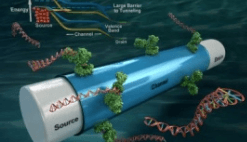Mr. T-FET is Faster and Way More Sensitive
on

Biosensors based on conventional field-effect transistors (FETs) are gaining momentum as a viable technology for the medical, forensic, and security sectors because they are more cost-effective than optical detection methods. FET-based biosensors enable scalability and label-free detection of biomolecules, eliminating the need for costly labeling of target molecules with fluorescent dyes. Researchers at the University of California, Santa Barbara now have designed a new device, a so-called tunnel-FET (T-FET) sensor, that is faster and four orders of magnitude more sensitive than conventional FETs, thus enabling detection of biomolecules at ultra-low concentrations.
The operating principle of FET-based biosensors is similar to that of FETs used in electronic circuits with the exception that there is no physical gate. The role of the gate is performed by ions of the biomolecules they are intended to detect. In order to trap these biomolecules, the dielectric surface surrounding the semiconductor device is coated with a specific receptor that can bind to the target biomolecules in a process called conjugation. The key concept behind the new device is a current injection mechanism that leverages biomolecule conjugation to bend the energy bands in the channel region, leading to the quantum-mechanical phenomenon of band-to-band tunneling. The result is an abrupt increase in current, which is instrumental to increasing the sensitivity and reducing the response time of the sensor.



Discussion (0 comments)